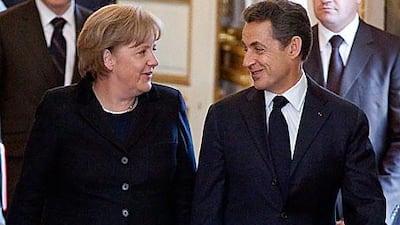MARSEILLE, FRANCE // The last-ditch "Merkozy' campaign to save the euro began in earnest yesterday when the German chancellor, Angela Merkel, and the French president, Nicolas Sarkozy, agreed to press for a new European Union treaty to impose tough fiscal controls.
Despite their differences on remedies for the gravest crisis in the euro zone's 12-year history, the two leaders - determined to present a united front ahead of a two-day EU summit starting in Brussels on Thursday - approved a series of reforms at negotiations in Paris.
"We want to make sure the imbalances that led to the situation in the euro zone today cannot happen again," Mr Sarkozy said at a news conference.
"Therefore we want a new treaty, to make clear to the peoples of Europe, members of Europe and members of the euro zone that things cannot continue as they are."
The two leaders now agree that any state that allows its deficit to exceed 3 per cent of its gross domestic product (GDP) should face sanctions. Governments are supposed to follow this rule already, but many, including France, have flouted it.
If consensus cannot be achieved throughout the 27-nation EU, France and Germany will draw up the new treaty for the single currency zone's 17 members, with EU outsiders permitted to join.
The Elysée meeting came as Italian legislators considered a €30 billion (Dh148.5bn) programme of cuts and tax rises that the new prime minister, Mario Monti, admits may deepen recession. One Italian political leader, the welfare minister Elsa Fornero, broke down in tears at the news conference as she outlined measures that had, she said, taken a "psychological toll" on her.
Ireland was also preparing yesterday to embrace a new austerity package amid fears that the zone faces bleak times ahead if it is to remain intact.
Markets rose as hopes grew that Mr Sarkozy and Mrs Merkel would find enough common ground to forge an approach capable of winning over leaders of the EU. European stocks built on the gains of last week and bond yields fell, notably in Italy where they went beneath 6 per cent for the first time since October.
Today, the US treasury secretary, Timothy Geithner, is due in Germany for the start of a round of talks also taking him to France and Italy and reflecting US concerns that the crisis could spread beyond European borders. Further developments are likely at Thursday's monthly policy meeting of the European Central Bank.
France and Germany had been seeking broader cooperation among euro countries to prevent a repetition of the fiscal laxity that has brought Greece and Italy to their knees and threatened to destroy the single currency.
Mr Sarkozy and Mrs Merkel have not seen eye-to-eye on fundamental issues, with France anxious to retain greater national sovereignty while Germany, with the stronger economy, strongly favouring stringent centralised control.
Britain, while outside the euro zone, has serious reservations about changes needing an amended EU treaty and the time they could take to have an effect.
But Mrs Merkel, who had earlier called for "concrete steps towards a fiscal union, said after yesterday's meeting that both France and Germany wanted structural changes that "go beyond agreements".
"This package shows that we are absolutely determined to keep the euro as a stable currency and as an important contributor to European stability," she added. She seems to have given ground on sovereignty, conceding that the new central mechanism could not invalidate a country's budget.
Mr Sarkozy said the new treaty could be passed by next March - a month before the first round of the French presidential elections.
The process of securing treaty changes, which has proved a minefield in the past, could take more than a year and some analysts doubt whether eurozone nations can be trusted to push forward with a radically new fiscal regime.
And many economists fear the new rules alone would not be enough to halt the rise in Europe's borrowing costs. Mrs Merkel has argued for such amendments as necessary to put muscle into new rules while the French president, approaching 2012 elections trailing badly in opinion polls, fears electoral backlash if he surrenders too much power to the EU.
A growing number of French people say they would welcome a return to the franc and a break with the single currency is the official policy of Marine Le Pen's far-right, populist Front National.
All European leaders will be gauging public opinion, and this is where economists sense danger. "There is a real danger that anything agreed this week will be watered down as it goes through the process of approval at national levels and what we end up with is less of a fiscal union more of a strengthened stability pact," said Gary Jenkins, from Evolution Securities.
Mr Sarkozy again stressed that he endorsed German opposition to the introduction of Eurobonds, which he described as "in no case a solution to the crisis".
foreign.desk@thenational.ae
* Additional reporting by Reuters and Associated Press


